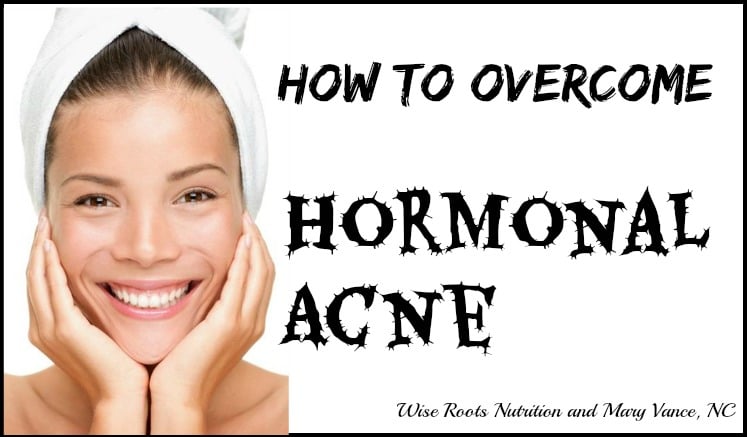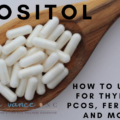This is a guest post by my colleague and friend Carla Hernandez, The Acne RD. Carla is a certified nutritionist and Registered Dietician who is passionate about holistic skincare and natural beauty. She takes an integrative, real food approach in her practice to help her clients determine the root causes of skin conditions like acne, psoriasis and eczema. See her full bio at the end of the post.
There’s a misconception that hormonal acne is a teenage problem, but the truth of the matter is that it can affect anyone with a hormone imbalance. Even dermatologists are finding that late onset acne is becoming increasingly common in women in their 20’s, 30’s, 40’s, and even 50’s.
According to the American Academy of Dermatology, a study examining the prevalence of acne in adults over age 20 found that acne affects more than 50 percent of women between the ages of 20-29 and more than 25 percent of women between the ages of 40-49. This is evidence that acne is not a teenage problem. Adult acne is affecting women more now than ever, a telling sign that hormone imbalance is prevalent and should be carefully considered.
What is Hormonal Acne?
A woman’s delicate endocrine system typically puts her more at risk than men for hormonal problems, especially in relation to acne and the skin. Hormonal acne can be described as cystic acne that appears around the jawline, mouth, and chin specifically. Breakouts are not just small pimples but typically red, inflamed, cystic nodules that take much longer to go away and heal. It can be difficult to pinpoint which hormones are the culprits. Ideally, testing hormones via blood or saliva is a good start so you know exactly where your levels are. Guessing can make matters worse and also make treatment that much more difficult. Even if you don’t have access to testing, you can address your symptoms so you have a better understanding of what’s going on.
Throughout the years of figuring out my own hormonal journey, as well as working with clients and doing research and continuing education, I have personally found that these 3 imbalances are the most common causes of hormonal acne:
-
- High Testosterone/Androgens/ DHEA-S: By far the most common, and typically associated with PCOS (polycystic ovarian syndrome, usually caused by carrying excess weight and being insulin resistant, although one can have PCOS and not be overweight). Stress can also be a huge factor in increased DHEA-S levels.
- High estrogen: Diet and lifestyle influences estrogen dominance the most through the foods we consume, our cookware, cleaning supplies, drinking water, drug exposure, cosmetics, environment, etc. Cleaning up your environment and exposure are ways to reduce xenoestrogens.
- Low estrogen: Causes include low body fat levels due to caloric restriction and/or over exercising, which can also lead to hypothalamic amenorrhea. Menopause is also a culprit. Side note: The importance of balanced estrogen levels is protective against acne. Estrogen is able to off-set high testosterone levels in the blood via an increase in sex-hormone-binding-globulin (SHB), which binds to testosterone.
These specific imbalances are not concrete, and it is not uncommon to have a variation of all of the above (or others, which is why I recommend testing if possible).
How to Overcome Hormonal Acne
Contrary to the conventional approach, birth control and hormone replacement therapy are not necessary to address hormonal acne. Simply addressing diet and lifestyle changes can make a world of a difference for most women. This is key to supporting overall health, but is especially critical to a maintaining healthy hormones and preventing side effects and long term consequences to conventional options.
Diet first and foremost! Look at diet as the foundation from which your body heals. Ideally eating a diet that is low glycemic, rich in healthy fats for the building blocks of hormones, and that controls blood sugar is ideal.
Give your Liver TLC: Your liver is your body’s primary detoxification organ. One of its primary functions is metabolizing and ridding the body of excess hormones. When the liver is stressed and congested, it is not able to efficiently detox excess hormones and other toxins. Dandelion and burdock root are great to support liver function. Supporting both phase 1 and phase 2 detoxification is essential in helping the liver decongest and work efficiently. Learn more foods and tips to support your liver here.
It’s also important that your bowels are moving! You simply can’t excrete toxins from your body if you’re backed up. If this is the case, while you work on getting to the root of the problem, magnesium works wonders. Taking magnesium in large amounts (anywhere from 300-1200mg will usually do the trick), which will help to relax muscles and allow for a natural laxative effect that is not dangerous and safe to use long term if needed.
Manage Stress: There’s no getting around this one. If you’re eating well and exercising but not addressing your stress load, you’re doing your body a disservice. It’s practically impossible to naturally balance hormones without addressing stress. Your adrenal glands are mainly in charge of your stress response, and DHEA-S is the most abundant of over 150 hormones produced by the adrenals. DHEA is a precursor for both estrogens and testosterone in both males and females. For clear skin, we want to ensure that DHEA-S levels are not elevated; otherwise, both estrogen and testosterone levels can rise, increasing the risk of acne. Therefore, if DHEA-S is elevated, we can usually assume the adrenals are working harder than they should, which in turn makes addressing stress management a priority.
Give support when needed: When the body is drained, sometimes it needs a little love to reboot, and supplemental support may be warranted. One of my favorites to help balance hormones is Vitex, also known as chastetree berry, an herb that can be especially helpful with infertility and other menstrual irregularities. DIM and Calcium-D-glucarate help rid excess estrogen and toxins from the body. If you’re looking for a more comprehensive formula that is popular with my clients, this overall female support supplement contains all three. How long to supplement? Some people may only need supplements for a few months, whereas may need more ongoing support. For example, adrenal/energy support can be used consistently if one has an extra crazy or stressful lifestyle. Everyone is different; there is no cookie cutter formula for everyone.
Exercise appropriately: We all know exercise is good for us, but the type of exercise one does can either help in the recovery of hormone imbalance, or make matters worse. Typically exercise that is extremely rigorous just adds to the stress adrenals are already experiencing, causing them to pump out more cortisol and more DHEA-S, which could lead to increased estrogen and testosterone levels. This is why I usually recommend limiting your exercise routine to more mindful, low impact activities when starting to implement changes, such as yoga, pilates, dance, and even meditation. Exercise for your mind and body is a great focus, because what affects your mind affects your body’s physiological response.
Many of my clients have seen a world of a difference when it comes to how their skin looks just from implementing these recommendations. Keep in mind everyone is different and will react differently. However, more often than not, after a consistent 1-3 months following a clean, low sugar, whole foods diet, coupled with addressing stress and supporting your liver health, hormonal acne should improve!
About the Author
Carla Hernandez is a Certified Nutritionist and RD. She has a passion for skincare and anything natural beauty. Her practice and blog, The Acne RD, is an integrative approach that focuses on promoting clear healthy skin by focusing on the root cause of skin challenges, such as acne, psoriasis and eczema.

Mary Vance is a Certified Nutrition Consultant and author specializing in digestive health. She combines a science-based approach with natural therapies to rebalance the body. In addition to her 1:1 coaching, she offers courses to help you heal your gut and improve your health. Mary lives in San Francisco and Lake Tahoe in Northern California. Read more about her coaching practice here and her background here.









Wow very helpful information. I just read your blog and it seems you have studied and experienced a lot. It is a great thing that you are sharing this whole information with us.
One of the best article I have read today, Thank you for sharing this with us…you really made my day
I highly recommend dermalmd blemish serum for those one-off singular hormonal breakouts that are huge and could last on your face for a week+. Using dermalmd serum reduces it to 2 days without harsh effects of rubbing alcohol. Very happy to have found this. So much for your $$—this serum bottle will easily last 1-2 years.
I have bought blemish serum of dermalmd for my daughter who suffers from bad skin as a hormonal teenager. After using them for a couple of months have noticed a reduction in the inflammation and breakouts.